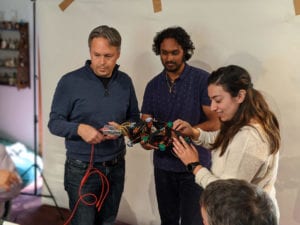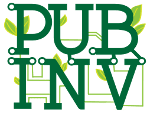You Don’t Have to be an Engineer to be a Public Inventor
Engineering skills are useful in many invention projects, but many of the people already working on Public Invention teams do not have an engineering background. Part of the rationale for Public Invention is that technical developments in the last couple of decades (including 3D printing, cheap prototyping, abundant information online, and economical microcomputers like the Arduino and Raspberry Pi—see the paper on What Makes a Good Public Invention Project) have lowered the barriers to invention.
In addition, this organization is built around organizing and supporting invention teams. If your project needs specific design or other technical skills that you don’t have, we can help you find a partner or mentor to help with those aspects, or assist you in developing those skills yourself.

You Don’t Have to be at a University or a Corporate Lab to be a Public Inventor
Several students have participated in Public Invention projects and are featured on our web site, and we seek and welcome faculty as Invention Coaches or consultants where their expertise can help significantly. Students in particular may find that our projects give them a practical application experience to supplement their academics. However, the same developments mentioned in the previous section enable people from all backgrounds and situations to participate in the invention process.
Citizen Science initiatives such as SETI@Home and the Zooniverse have proved that great numbers of people outside the academic or corporate environment can contribute to important research. Public Invention is demonstrating that such people can join the vanguard of invention, developing technology to benefit all humankind.
Experience in writing academic papers isn’t needed, either. The core principles of Public Invention include “Share everything equally and immediately.” This can be through web dissemination, including GitHub, but several results have been published in journals or at technical conferences – and Public Invention can assist with that process, providing suggestions and guidance as needed.
You Don’t Have to be a Maker to be a Public Inventor
There are many technical skills, from metalwork and 3D printing to electronics prototyping and computer programming, which can be very valuable parts of the invention process. But Public Invention can be a great way of developing or improving those skills! Public Inventors work in teams, and skill transfer is an important part of that team process. Also, you will find that there are meta-skills of how to learn about new techniques and equipment, and gaining those meta-skills may be the most important side benefit of participating.
If you are already an experienced Maker, Public Invention offers a way for you to put your skills and enthusiasm to the benefit of everyone, and also to transfer those skills and passions to team members. It will also help you find projects to stretch your skills and expand them into new areas.
You Don’t Have to be a Math Whiz to be a Public Inventor
Mathematics is the language of science, but many famous inventors (Alexander Graham Bell, Thomas Edison, and Michael Faraday among others) have been less than proficient at math. For basic research, it’s hard to do without it, but Faraday invented the electric motor and the first generator despite that limitation—although his theory of light as an electromagnetic radiation had to wait on James Clerk Maxwell’s mathematical framework.
If your invention project is breaking new scientific ground, it may be valuable to team up with someone more mathematically inclined to explore and document those aspects. Or this might be just the opportunity to expand your own horizons! As with many other aspects of Public Invention, the internet is a great enabler, and there are many websites to assist with complex calculations and formulas.
You Don’t Have to be a Public Inventor all on Your Own!
Public Invention will usually be a team activity. Several of the earlier topics have touched on this, but this is important enough to emphasize here at the end. If you already have a project in mind, an Invention Coach can help you define and organize the work, and mentor you with many technical aspects. The Coach can also help to recruit volunteers with specialized skills that may be needed.
And if the designing, building, and experimenting aspects don’t suit you but you would like to contribute to the humanitarian goals in other ways, many projects need a wide variety of skills, from art and photography through writing and graphic design, from field work in invention trials through review and editing of documents, event organization, and logistics. Raise your hand and join! Well, actually, just use the Contact Us or Volunteer forms from the main menu of the website. We look forward to meeting you!
